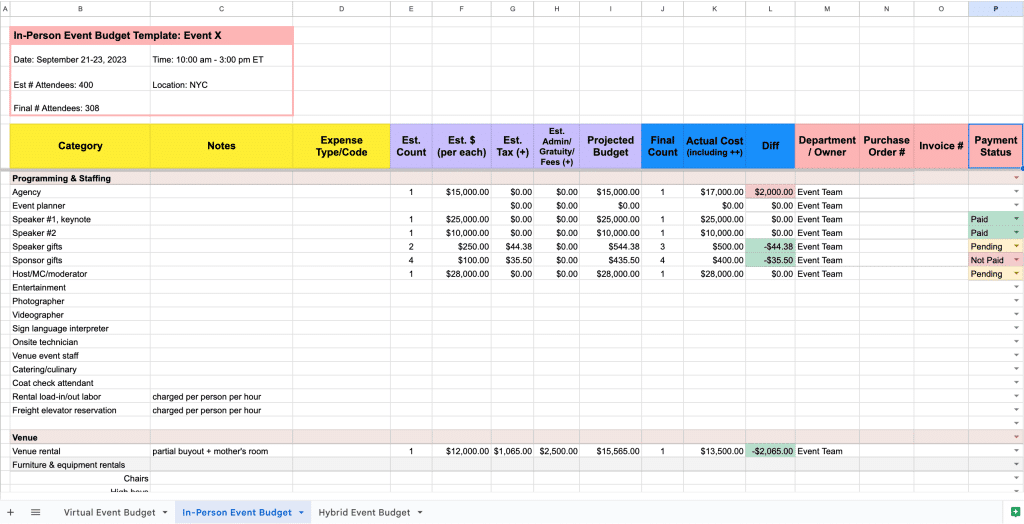Even in ideal economic circumstances, creating an event budget is a challenging feat. In an era of rising inflation and higher interest rates, it’s even harder.
Not only are vendor prices on the rise and hard to predict, but it’s also increasingly common for hidden costs — such as permit fees, insurance, and security expenses — to impact bottom lines. Plus, there’s the issue of scope creep: What starts as a small idea can rapidly expand, creating additional budgetary pressures.
Making matters more challenging is the fact that 41% of event professionals are putting on more events in 2023, but 53% of them agree that the biggest challenge they face is decreasing budgets, according to Bizzabo data.
In other words, event teams have become masters of doing more with less.
If you’re looking to create a conference budget that enables you to strike the perfect balance between what you can afford and the caliber of event experience you want to deliver, you’ve come to the right place. Keep reading to learn how to create a conference budget, costs to consider, and promotional expenses you won’t want to forget — plus get access to our event budgeting templates.
How To Create a Conference Budget
When it comes to event budgeting, aim to produce a budget that is realistic, well-informed, and affordable. By managing your event budget effectively, you can increase the chances that your conference is a success and that attendees are engaged and have a good time. As you begin creating your event budget, remember these five tips to strike the perfect balance.
1. Set Realistic Event Goals Aligned with Business Goals
The better you can define your objectives and the outcomes you’re hoping to achieve at your next conference, the easier it will be to create a budget that helps you accomplish your goals. By setting realistic event goals, you can prioritize expenses and allocate resources effectively.
2. Use Historical Data to Inform Your Budget
How much did you spend at your last event? Was it too much, too little, or just right? Analyze past conference budgets and expenses to get insights into spending patterns and identify areas where you can cut costs. Leveraging this historical data will enable you to make better-informed decisions about your event budget.
3. Don’t Overlook Small Items — They Can Add Up Easily
For many event professionals, it’s far too easy to overlook the small things that add up and significantly impact the budget. Some items include printing materials, signage, name badges, and Wi-Fi access. Create a list of must-have things for your event to ensure all essential costs are accounted for.
4. Overcommunicate with Stakeholders About the Budget
Creating an event budget involves many moving parts. To ensure you don’t overlook anything, maintain open lines of communication with all event stakeholders, including management, finance, and event sponsors. By clearly communicating expected costs, the rationale for each line item, and any changes throughout the planning process, you can ensure everyone is on the same page and manage expectations effectively.
5. Bring on Sponsors To Help Offset Costs and Increase Reach
No rule says you must pay for the entire event out of your pocket. One of the easiest ways to offset some of your event budget expenses is by actively seeking event sponsorship opportunities. In addition to providing actual cash, sponsors can help with in-kind marketing support and services during the event. This can enable you to stretch your budget while extending your event’s reach and enhancing the attendee experience.
Checklist: Event Costs To Consider
Now that you know better how to approach event budgeting, let’s take a more granular look at some event costs you need to consider.
Staffing
What are the costs of your employees planning, managing, and executing the event? What about third-party event professionals — like A/V technicians, caterers, and security personnel?
Speakers
Consider the costs of hiring speakers for your conference, including speaking fees, travel fees, accommodations, and technology expenses.
Signage and Branding
Set aside money for signage, banners, posters, and other visual elements to display company branding and event information. Don’t forget about design, printing, and installation costs, either.
Brand Activations and Special Experiences
If your event will have interactive exhibits, photo booths, or virtual reality experiences, figure out how much you’ll need to spend on production, equipment rentals, staffing, and other associated expenses.
Marketing
How are you going to promote your event? Think about content marketing, social media marketing, email marketing, media placements, and other similar expenses.
Contingency Funds
No matter how meticulously you plan your event, it’s only a matter of time before unexpected expenses enter the equation. Set aside some cash so you can mitigate risks and navigate unforeseen circumstances.
Software and Event Technology
You’ll also need event management technology, including a mobile event app, attendance tracking tools, and other solutions. Be sure to consider all-in-one event management software so you can cut down on costs while getting everything you need to plan, promote, execute, and measure the success of your event.
Venue
Budget for the venue rental fee, including setup and teardown costs, insurance, security, cleaning services, and technology costs.
Swag
If you’re planning to give away event swag, consider the costs associated with printing, shipping, storage, and design. Today, event attendees want swag that is more meaningful — think donations, reusable items, and sustainable materials — which could amp up your swag budget.
Food and Beverage
Set aside funds for meals, snacks, and drinks, as well as plates, plasticware, cups, and napkins. Don’t forget that using compostable materials is practically a must with today’s event attendees, and this can increase your budget in unexpected ways.
Although many event promotion activities can be free, you’ll likely incur additional costs when you begin raising awareness about your event. These include the following:
- Paid search. To get more eyeballs on your event content, you will likely want to spend money on services like Google Ads. Consider the costs that stem from keyword research, ad creation, campaign monitoring, and cost-per-click rates for the keywords you’re targeting.
- Public relations. To generate buzz, consider hiring a PR agency that can help with media placements, press releases, and media kits.
- Paid social. Your events team will already be spreading the word on social media. To amplify those efforts, you can leverage paid advertising on sites like LinkedIn, Instagram, and Twitter.
- Direct mail. Depending on the nature of your event, you may also want to reach out to potential attendees via direct mail. If you go this route, consider costs associated with printing, postage, and procuring mailing lists.
Bonus: Get This Free Excel Event Budgeting Template
Need help creating a budget for your next event? We’re giving you ungated access to the same event planning budget templates we use here at Bizzabo. With our virtual budget template, hybrid budget template, and in-person conference event budget template, you can accurately plot the budget for your next event. Click the image below or click this link to get your own copy of our templates.

Get Started with our Event Budget Planning Guide
Event budgeting is a delicate balancing act. We’re here to help even further! To learn more about creating an event budget that helps you achieve your goals, check out our free guide: The Event Budgeting Guide for In-person, Virtual, and Hybrid Events.


